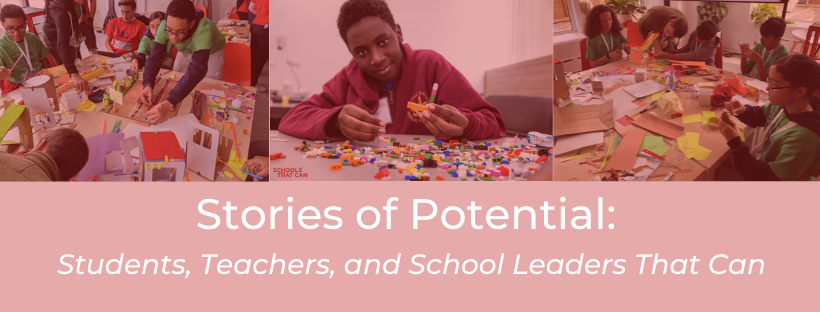
Anyone who has experienced the magic of Maker education up close knows the rush that comes from watching students engrossed in solving problems, excited to find solutions, and resilient when mistakes are made. Ivonne Cintron, technology teacher at Pioneer Academy in Queens, knows firsthand the difference maker education, technology, and math play in students’ educational experiences. As a former STC Maker Fellow, Cintron has been involved in Schools That Can’s work for four years, and explained that STC has been “really great, essential, and instrumental” in helping her and her co-teacher with training, including learning more about how they can bring STEM, coding, engineering, the design cycle, and design classes to students.
Among the resources Cintron said are most valuable is access to the other fellows, as they convene together three times a year. “We get to meet other teachers from the other schools,” Cintron explained, noting that it is helpful to share best practices and learn from each other, because ultimately, they are trying to do similar things in their classrooms. Cintron said that relationships with Schools That Can Chief Operating Officer, Casey Lamb, and Director of Maker Programs, Roger Horton, have proved invaluable, too, explaining that they’ve been supportive with any questions she has, and eager to share ideas. Refining coding and other maker programming her school runs has been a major benefit of her experience with Schools That Can, including imagining ways she can “dig deeper with the students and help them really understand the skills behind the coding, and why these are necessary skills as well in real life.”
When asked if there’s been a moment that stands out of students really responding to this work, Cintron references a favorite: The Schools That Can Pop-Up Makerspace. One year, she explained, students got to go to Google headquarters in Manhattan. Students got to see inside the company, including how the technology was used. “And they were able to meet some of the other schools as well, because all the schools were invited,” she added. Cintron said that the exposure was great, because students got to venture to different spaces and build on what they had learned in class. That’s important, Cintron said, because of “making the connection between what we’re learning, the [engineering] design cycle and how to problem solve, how to collaborate,” continuing that they emphasize critical thinking and perseverance in hopes that students will bring those skills to other subjects, too. “So that’s been really great for our students,” Cintron said. “They’ve been learning how to work together, they’re they’re learning… it’s okay to fail and keep trying. And just understanding that it’s okay to make mistakes as well.”
“I wish they knew just how important this is, especially to our students and our community here,” Cintron said of this program. “We’re a Title I school, and a lot of kids would not be getting any of these programs outside of school if it wasn’t for organizations like [partner] MakerState and Schools That Can.” Cintron pointed out that there are other good programs that require families to pay for them, which isn’t accessible to many students at her school. “We want people to know that we need to expose our kids a lot more,” Cintron said. “To show them that there are other careers out there, that if there is an interest in science and math, that there are paths for them to take, in the future to thrive on that.”

